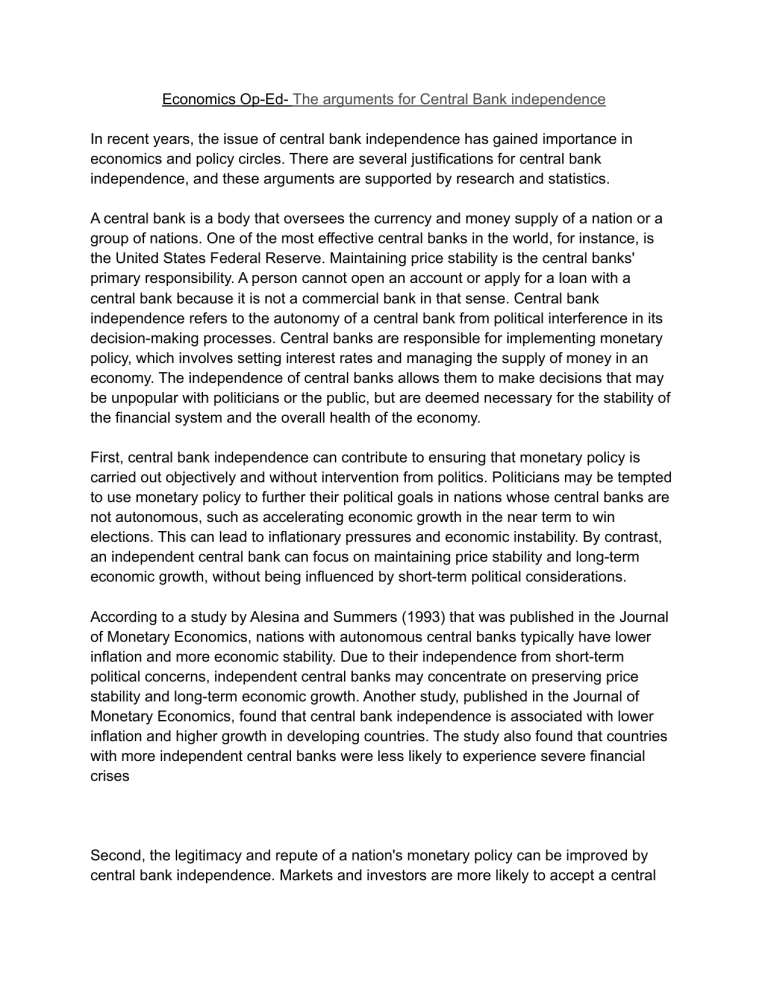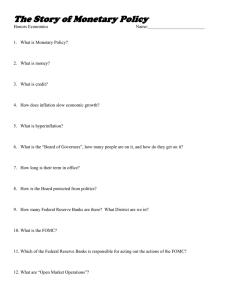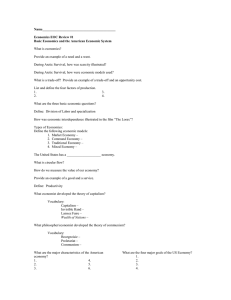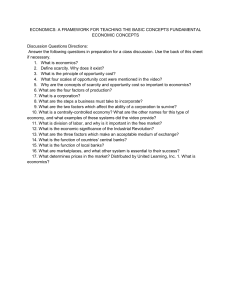
Economics Op-Ed- The arguments for Central Bank independence In recent years, the issue of central bank independence has gained importance in economics and policy circles. There are several justifications for central bank independence, and these arguments are supported by research and statistics. A central bank is a body that oversees the currency and money supply of a nation or a group of nations. One of the most effective central banks in the world, for instance, is the United States Federal Reserve. Maintaining price stability is the central banks' primary responsibility. A person cannot open an account or apply for a loan with a central bank because it is not a commercial bank in that sense. Central bank independence refers to the autonomy of a central bank from political interference in its decision-making processes. Central banks are responsible for implementing monetary policy, which involves setting interest rates and managing the supply of money in an economy. The independence of central banks allows them to make decisions that may be unpopular with politicians or the public, but are deemed necessary for the stability of the financial system and the overall health of the economy. First, central bank independence can contribute to ensuring that monetary policy is carried out objectively and without intervention from politics. Politicians may be tempted to use monetary policy to further their political goals in nations whose central banks are not autonomous, such as accelerating economic growth in the near term to win elections. This can lead to inflationary pressures and economic instability. By contrast, an independent central bank can focus on maintaining price stability and long-term economic growth, without being influenced by short-term political considerations. According to a study by Alesina and Summers (1993) that was published in the Journal of Monetary Economics, nations with autonomous central banks typically have lower inflation and more economic stability. Due to their independence from short-term political concerns, independent central banks may concentrate on preserving price stability and long-term economic growth. Another study, published in the Journal of Monetary Economics, found that central bank independence is associated with lower inflation and higher growth in developing countries. The study also found that countries with more independent central banks were less likely to experience severe financial crises Second, the legitimacy and repute of a nation's monetary policy can be improved by central bank independence. Markets and investors are more likely to accept a central bank's choices when it is seen as independent, which helps support financial system stability. This can be particularly important in times of economic uncertainty when confidence in the central bank's ability to manage the money supply is crucial. In accordance with a study by Alesina and Barro (2006) that was published in the Journal of International Economics, nations with independent central banks are more likely to have low and stable interest rates, which can aid in luring in foreign investment and fostering economic growth. Additionally, a central bank that is independent from political interference is more likely to be able to make judgments that are in the best interests of the economy. This can help to increase confidence in the central bank and the overall economy. The study also found that central bank independence is associated with lower sovereign default risk. Third, the ability of the central bank to pursue unpopular but necessary policies can be safeguarded by central bank independence. As an illustration, if a central bank lacks independence, politicians may put pressure on it to maintain low-interest rates to boost economic growth, even if doing so runs the danger of inciting inflationary pressures. An independent central bank, on the other hand, can make decisions based on what is best for the long-term health of the economy, without fear of political backlash. The necessity of central bank independence is best illustrated by the worldwide financial crisis of 2008. Due in part to its independence from political interference, the Federal Reserve of the United States was able to act boldly and decisively throughout this crisis to stabilise the financial system.. This allowed the Fed to implement unpopular but necessary policies, such as large-scale asset purchases, without fear of political backlash. While there are arguments in favor of central bank independence, it is important to note that it is not a panacea. The decisions made by central banks occasionally may not be in the best interests of the economy since they are not immune to mistakes. Consequently, it is crucial that central banks take responsibility for their actions and practice transparency in their decision-making. Furthermore, it is worth noting that these studies do not necessarily prove that central bank independence causes better economic outcomes. On the other hand, they do suggest that central bank independence is associated with more favorable economic outcomes In conclusion, the arguments for central bank independence are strong. Central bank independence can be extremely important in preserving long-term economic stability because it protects the central bank's ability to conduct unpopular but essential policies and ensures that monetary policy is objective and free from political intervention. References: Alesina, A., & Summers, L. H. (1993). Central bank independence and macroeconomic performance: Some comparative evidence. Journal of Monetary Economics, 32(3), 463-484. Alesina, A., & Barro, R. J. (2006). Rare disasters and asset markets. Journal of International Economics, 70(1), 18-38. Bank, E.C. (2021). What is a central bank? [online] European Central Bank. Available at:What is a central bank?. International Monetary Fund (IMF). (2003). "Central bank independence, transparency, and accountability." In World Economic Outlook, Chapter 3. Retrieved from: Public Debt in Emerging Markets: Is It Too High? Alesina, A., & Summers, L. H. (1993). "Central bank independence and macroeconomic performance: Some comparative evidence." Journal of Money, Credit and Banking, 25(2), 151-162. Cukierman, A., & Laeven, L. (2004). "Central bank independence and economic performance: Some recent developments." Journal of Monetary Economics, 51(3), 437-480. World Bank. (n.d.). "Inflation, consumer prices (annual %)." Retrieved from: Inflation, consumer prices (annual %) - Sub-Saharan Africa World Bank. (n.d.). "GDP growth (annual %)." Retrieved from: GDP growth (annual %) Sub-Saharan Africa





